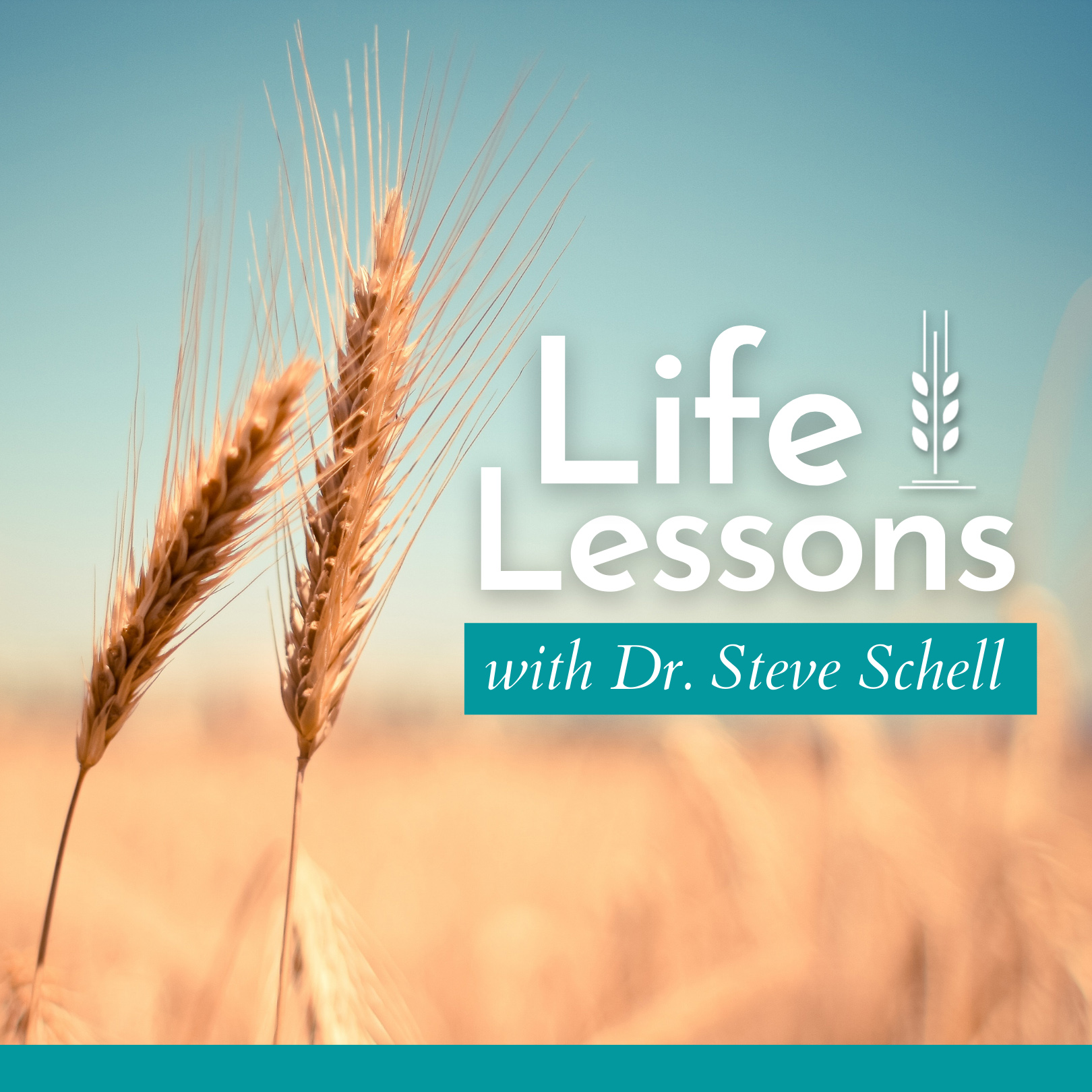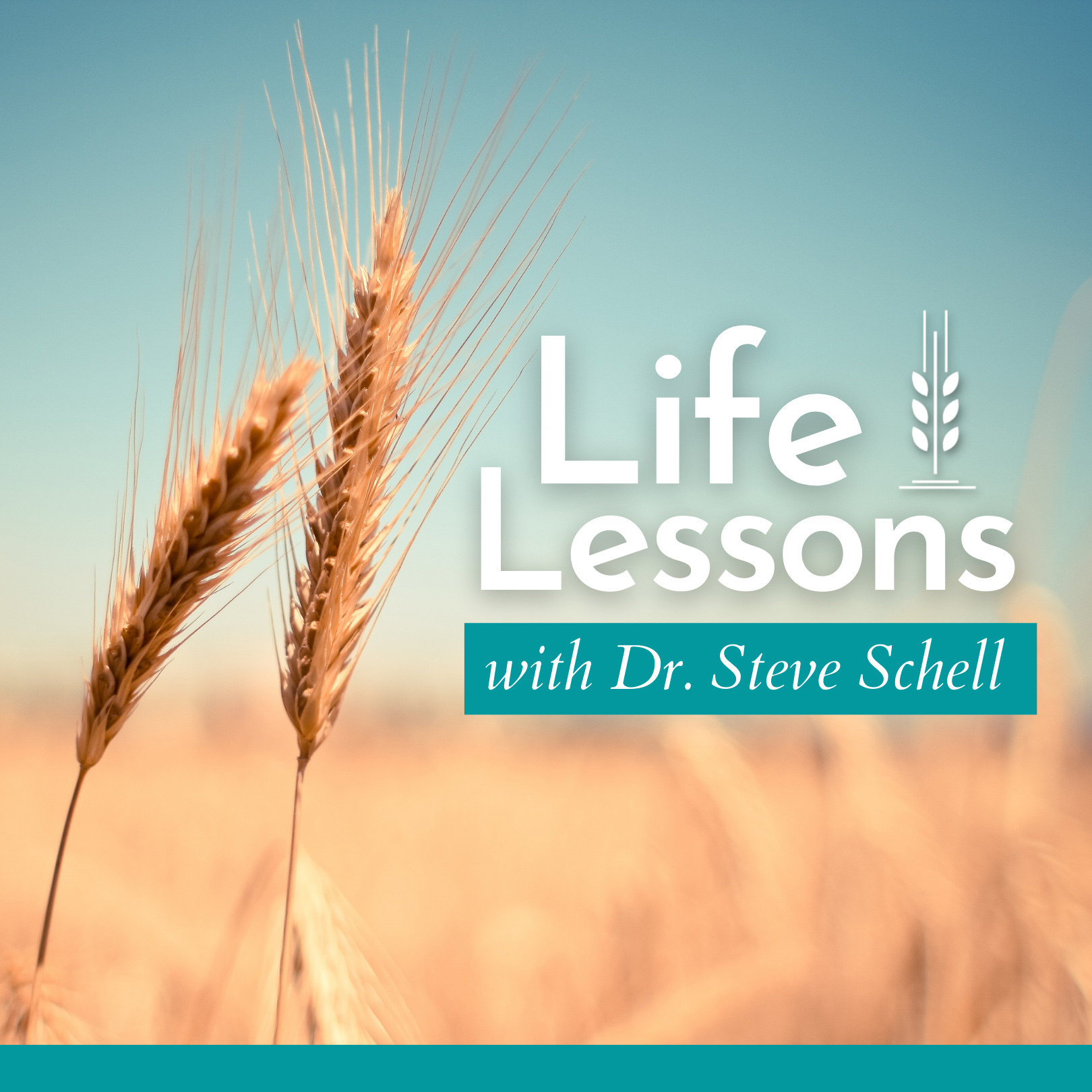
147K
Downloads
498
Episodes
Pastor Steve Schell comprehensively teaches through entire books of the Bible pulling out the deep, eternal truths in each section of Scripture without skipping over challenging passages. These sermons will help foster true discipleship for the committed Christian, both young and old.
Episodes

Thursday Mar 20, 2025
Ep 56 Kids of the Kingdom, Lk 18: 15-17
Thursday Mar 20, 2025
Thursday Mar 20, 2025
In this episode the Lord is currently on His way to Jerusalem at the end of His public ministry on earth. We don't know which town He is in right now, but He is coming down towards Jericho. The crowds are huge right now in His ministry, and in the midst of the thousands of people who are coming for healing, a group of parents are bringing their babies in arms and are asking Jesus to bless their children. And despite the disciples trying to prevent it, one at a time, Jesus folded each child into His arms and laid His hands on each child's head and blessed them. We will talk about four lessons from this occurrence Jesus has with His disciples and the children because the kingdom of heaven is made up of children.
To purchase Pastor Steve's newest book Understanding Romans: Life-Changing Lessons from Paul's Greatest Letter, visit Amazon.
Also check out our website at lifelessonspublishing.com for additional resources for pastors and leaders. We have recorded classes and other materials offered at no charge.

Monday Mar 17, 2025
Ep 55 The Widow and the Judge, Lk 18:1-8
Monday Mar 17, 2025
Monday Mar 17, 2025
The Lord told this parable to make sure His followers would never grow discouraged by God's seeming reluctance to punish their enemies. Though it would seem like God was refusing to answer their pleas for relief from persecution, they must not allow this to spoil their faith. They must continue to pray, believing God to answer all their needs.
To purchase Pastor Steve's newest book Understanding Romans: Life-Changing Lessons from Paul's Greatest Letter, visit Amazon.
Also check out our website at lifelessonspublishing.com for additional resources for pastors and leaders. We have recorded classes and other materials offered at no charge.

Thursday Mar 13, 2025
Ep 54 The Last Generation, Lk 17:20-37
Thursday Mar 13, 2025
Thursday Mar 13, 2025
Isn't it interesting that Jesus told His disciples about events which would not take place until the end of world history? Today we can say with confidence that many of these things would not take place for at least years (1967 + 32 = 1999; This sermon was originally preached in 1999). Why would believers need to know about something that far in the future? Obviously, Jesus felt they did, as did Paul (2Th 2:5) and Peter (2Pe 3:1-13) and John (1 Jn 4:3). And, if the early church needed this information, then we who are nearly 2,000 years closer to His return need it as much or more.
Jesus knew that to protect believers from being spiritually deceived and to give them the strength, they need to endure persecution; they must have God's perspective of human history. The forces at work in the last generation are present in every generation. As history moves towards its end, hostile spirits have and will spring up and repeatedly express themselves in human society. So by learning to understand what afflicted the last generation, we will recognize the spiritual causes of that which opposes God in our generation. Jesus knew that: 1) every generation will experience these same forces; 2) every generation must be vigilant and informed; 3) every generation needs hope; and 4) every new believer needs to be told these things to protect them.
To purchase Pastor Steve's newest book Understanding Romans: Life-Changing Lessons from Paul's Greatest Letter, visit Amazon.
Also check out our website at lifelessonspublishing.com for additional resources for pastors and leaders. We have recorded classes and other materials offered at no charge.

Monday Mar 10, 2025
Ep 53 Increase Our Faith, Lk 17:5-10
Monday Mar 10, 2025
Monday Mar 10, 2025
The apostles have asked the Lord to increase their faith, and in verses six through ten Luke records two of the foundational truths with which He answered them. Both are given to them as parables. The first, in verse six, reminds us to keep our attention focused on the unlimited power of God rather than the size of our own faith. It's God's power that does the work, and all we need is enough true faith to connect with Him. The second truth is the subject of our study today, and in this parable (vs. 7-10), Jesus bluntly warns us to never think we earn answers to prayers because of the service we do for God. When it comes to God answering prayers, He will no more reward us for ministering on His behalf than a slaveowner would reward a slave. The normal tendency in all humans is to try to earn God's blessings. When we have faithfully done things for Him, we assume He will be grateful and therefore be more ready to answer our prayers. But, this attitude is built on the presumption that we can earn God's favor.
By selecting the cruel institution of slavery, Jesus makes it unavoidably clear that when it comes to serving God, hard work would be followed by more hard work and, even after all was done, we still would not have earned one special favor from God. At first glance, this makes God sound like a thankless taskmaster who abuses His servants, but that is not what Jesus is saying, and from many of Jesus' other teachings we know God is not like a slave owner at all. We know He is thankful and will reward us for our service (Lk 12:37,43,47; 19:17) and does not consider us slaves, but rather His adopted children (Lk 15:19,21, 22; Jn 15:15;Gal 4:1-7). But, if we take Jesus' teaching to heart, we will never again rely on our good works to get God to answer our prayers.
To purchase Pastor Steve's newest book Understanding Romans: Life-Changing Lessons from Paul's Greatest Letter, visit Amazon.
Also check out our website at lifelessonspublishing.com for additional resources for pastors and leaders. We have recorded classes and other materials offered at no charge.

Thursday Mar 06, 2025
Ep 52 Forgiveness, Lk 17:1-6
Thursday Mar 06, 2025
Thursday Mar 06, 2025
In this episode, we are talking about forgiveness. It's one of those subjects you simply have to talk about regularly because offenses come, issues come into our hearts, and we can grow bitter and hard. So God is constantly reminding us through His word to forgive each other.
We will talk about two levels of forgiveness in this episode. We're not just talking about the personal offenses that take place, although we will touch on that, but we are talking in more detail about what happens when we see another believer slip into some serious moral or doctrinal error. God expects us to go after that person. In other words, when I start to slip, we can't say, "It's not my business," because we are a family of believers, and we are indeed our brother's keeper.
To purchase Pastor Steve's newest book Understanding Romans: Life-Changing Lessons from Paul's Greatest Letter, visit Amazon.
Also check out our website at lifelessonspublishing.com for additional resources for pastors and leaders. We have recorded classes and other materials offered at no charge.

Monday Mar 03, 2025
Ep 51 The Rich Man and Lazarus, Lk 16:19-31
Monday Mar 03, 2025
Monday Mar 03, 2025
In this parable Jesus pictures the death of two men. One is a rich, self-centered man who had no compassion on the poor, and the other was a beggar named Lazarus. Jesus takes us beyond the grave and lets us see what happens to each as they step into eternity. The passage is meant as a warning against hardening our hearts toward God, thinking that life will go on forever and that we will never have to account for our attitudes. It's also a warning to those who think they can make up excuses for ungodly behavior. We may justify ourselves in our own minds, but we will not fool God at all.
As we consider the rich man and his hard-hearted family, we will look more closely at the forces that harden a person's heart, and ways in which God is able to soften hearts so a person can be saved before he/she dies. All of us know people who stubbornly resist repenting and turning to God. Understanding why people refuse to turn to God and how God works to win them back to Himself should help us pray for such people and to be more patient while we're waiting. And through it all, we must remember no one loves hard-hearted people more than God (Eze 18:23: Jn 3:16:2Pe 3:9).
To purchase Pastor Steve's newest book Understanding Romans: Life-Changing Lessons from Paul's Greatest Letter, visit Amazon.
Also check out our website at lifelessonspublishing.com for additional resources for pastors and leaders. We have recorded classes and other materials offered at no charge.

Thursday Feb 27, 2025
Ep 50 Managing God's Money, Lk 16:1-13
Thursday Feb 27, 2025
Thursday Feb 27, 2025
Listeners, we are so sorry we had a technical glitch in this episode! But we have fixed it, so please listen again.
You and I need to be faithful managers of God's money. But how do we do that in a practical sense?
As we continue through the book of Luke, we are looking in this chapter at more of what Jesus says specifically to His disciples as opposed to the Jewish leaders. So if you are a disciple of Jesus, these words are for you! In this episode we will look at the basic principles of this parable and then ask how we can be faithful managers ourselves.
To purchase Pastor Steve's newest book Understanding Romans: Life-Changing Lessons from Paul's Greatest Letter, visit Amazon.
Also check out our website at lifelessonspublishing.com for additional resources for pastors and leaders. We have recorded classes and other materials offered at no charge.

Monday Feb 24, 2025
Ep49 Elder Brother Syndrome, Lk 15:25-32
Monday Feb 24, 2025
Monday Feb 24, 2025
People who zealously give themselves to faithful service can always be in danger of falling into "Elder Brother Syndrome." A common termused today is "burnout." This is not a problem reserved for Pharisees and scribes, but can and does affect Christians—especially Christians who hold themselves to high standards and consistently give time and energy to serve God. You would think that those who hold themselves to high standards and consistently serve God would automatically have a great relationship with God and be overflowing with joy, but this is not always the case. Without certain principles and skills being practiced in our lives we can, like the elder brother, develop feelings of alienation, self-pity, lovelessness and pride.
To purchase Pastor Steve's newest book Understanding Romans: Life-Changing Lessons from Paul's Greatest Letter, visit Amazon.
Also check out our website at lifelessonspublishing.com for additional resources for pastors and leaders. We have recorded classes and other materials offered at no charge.

Thursday Feb 20, 2025
Ep 48 The Prodigal Son, Lk 14:25-15:27
Thursday Feb 20, 2025
Thursday Feb 20, 2025
Jesus has been talking to religious leaders and great multitudes of people, and He gives a severe call to discipleship, telling the full price a disciple would pay up front. And as we look at the well known parable of The Prodigal Son, it is good to keep this cost of discipleship in mind. Jesus is really talking about priorities. Following Christ comes first.
To purchase Pastor Steve's newest book Understanding Romans: Life-Changing Lessons from Paul's Greatest Letter, visit Amazon.
Also check out our website at lifelessonspublishing.com for additional resources for pastors and leaders. We have recorded classes and other materials offered at no charge.

Monday Feb 17, 2025
Ep 47 A Missionary Heart, Lk 14:12-24
Monday Feb 17, 2025
Monday Feb 17, 2025
Every Christian can't move to a foreign nation to be a missionary, but every Christian should have the heart of a missionary. In these two parables Jesus looks deep into the heart at our motives for serving people, and the attitudes He teaches us are those which we typically associate with a missionary. Jesus' teaching should also act as a checklist to see if we are sensing God as effectively as possible, because He tells us who we should be seeking to reach. No one person could possibly reach all the people Jesus is inviting to heaven, but if each Christian has the heart of a missionary, we'll see results beyond our fondest hopes.
To purchase Pastor Steve's newest book Understanding Romans: Life-Changing Lessons from Paul's Greatest Letter, visit Amazon.
Also check out our website at lifelessonspublishing.com for additional resources for pastors and leaders. We have recorded classes and other materials offered at no charge.
